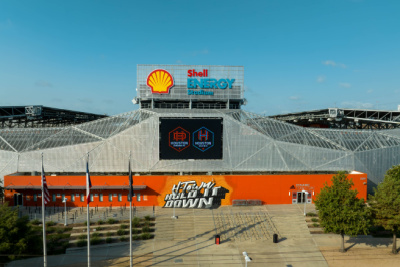As facilities professionals at stadiums, arenas, and other major sports venues around the world continue to explore ways to make their buildings more sustainable and lower their environmental impact, they should pay attention to the work currently being done at Shell Energy Stadium in Houston, Texas.
The announced goal is to reduce the stadium’s carbon footprint by 50% by 2026. The significant renovations and investments being made by the stadium’s team and the Houston Dynamo FC were recently highlighted as part of a CityAge Houston virtual conversation entitled “Fireside Chat—Shell Energy Stadium and Houston Dynamo FC.”

Quick Facts
Organization: Shell Energy Stadium
Location: Houston, Texas
Type of project: Sustainability upgrades
Size: 340,000 square feet
Estimated cost: N/A
Status: Ongoing
Estimated completion: 2026
Stadium History
Opening its doors to Houston sports fans in May 2012, Shell Energy Stadium is an open-air; 340,000-square-foot; 21,000-seat stadium that serves as the home of the Houston Dynamo FC (Major League Soccer (MLS)), the Houston Dash (National Women’s Soccer League (NWSL)), and Texas Southern University football. The stadium also hosts various professional, collegiate, and community sporting events; concerts; and conventions, including the 2023 CONCACAF Gold Cup, the U.S. Women’s National Team, and USA Rugby.
Making history as the first soccer-specific stadium in MLS to be located in a city’s downtown district and following an estimated $95 million construction cost, the stadium first opened under the name of BBVA Compass Stadium (2012 to 2019). Following additional name changes—BBVA Stadium from 2019 to 2021 and PNC Stadium from 2021 to 2022—Shell Energy officially announced a partnership with the Houston Dynamo FC and Houston Dash in January 2023, including a naming rights agreement that would kick off the 2023 MLS season under the new name of Shell Energy Stadium.
New Partnership Means More Sustainability
The push for a more sustainable stadium operation is nothing new for this facility, which earned a Leadership in Energy and Environmental Design (LEED) Silver Certification from the U.S. Green Building Council during its inaugural season in 2012. Environmentally friendly strategies that were incorporated in the original stadium design included diverting on-site generated construction waste from the landfill, reducing energy and water use, encouraging recycling, and providing preferred parking for low-emitting and fuel-efficient vehicles. The stadium was also designed with an energy-efficient roof and incorporated sustainable and environmentally friendly construction and operation practices.
Now embarking on this innovative and collaborative partnership with Shell Energy, the stadium’s team and Houston Dynamo FC have their sights set on the new goal of decarbonization and, as their branding states, “building a better energy future together.” According to Lana Ramirez, Shell Energy Stadium’s assistant general manager, this renewed commitment to sustainability calls for significant improvements to the stadium. “We’re really working on new ways to reduce our carbon footprint so our goal with Shell is to decrease our carbon footprint by 50 percent by 2026,” she said, adding that Houston will be hosting the World Cup in 2026.
Ramirez also explained that four of the major projects Shell Energy Stadium is working on include:
- Installation of solar panels on the south administration building of the stadium
- Replacing about 2,000 light fixtures with LED
- Installing electric vehicle (EV) chargers in the back-of-house area for staff and players to use on game day
- Installing a submetering system
Furthermore, the Shell Energy Stadium website states that for facility sustainability practices, “beginning in early 2023, Shell Energy will institute a decarbonization program starting with energy efficiency improvements to venue-wide LED lighting, on-site renewable energy via a rooftop solar array, renewable electricity, energy monitoring and management with a sub-metering system and installation of electric vehicle charging stations.
“The Club and Shell Energy are pursuing a variety of integrated energy and decarbonization solutions at the stadium. This includes a near-term goal to reduce the Club’s scope one and scope two greenhouse gas emissions by 50 percent by 2026 from a 2018 base year.”
Other Sustainability Initiatives
S.J. Luedtke, chief marketing officer for Houston Dynamo FC, added that as part of the ongoing decarbonization initiative, the stadium is encouraging customers to use Houston’s light-rail network, MetroRail, and other forms of mass transportation to get to the stadium on game day.
She also said they’re working with their concession vendor, Levy, as well as their merchandise vendor, Fanatics, on ways to create more sustainable game day operations and products. Specifically, the Shell Energy Stadium website states that Levy uses local growers for produce and meats and eco-friendly utensils.
“Obviously sometimes there’s a certain connotation that comes with working with an energy partner but what we love about Shell is that they realize there is a need for this type of service and solutions to be brought to both B2B (business to business) and B2C (business to consumer) customers,” Luedtke added.
Learn More
Learn more about the Shell Energy Stadium by checking out the full session here, and don’t forget to visit the CityAge YouTube Channel for all the CityAge sessions.
Do you have a major project announcement you’d like considered for the “Under Construction” series? Please contact Editor Joe Bebon at JBebon@BLR.com.

